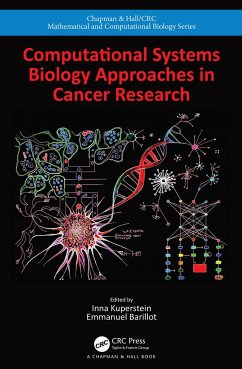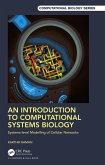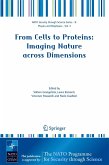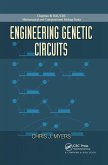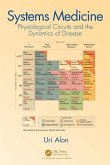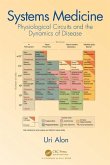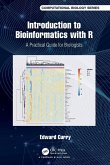Computational Systems Biology Approaches in Cancer Research
Herausgeber: Kuperstein, Inna; Barillot, Emmanuel
Computational Systems Biology Approaches in Cancer Research
Herausgeber: Kuperstein, Inna; Barillot, Emmanuel
- Gebundenes Buch
- Merkliste
- Auf die Merkliste
- Bewerten Bewerten
- Teilen
- Produkt teilen
- Produkterinnerung
- Produkterinnerung
With the availability of massive amounts of data in biology, the need for advanced computational tools and techniques is becoming increasingly important and key in understanding biology in disease and healthy states.
Andere Kunden interessierten sich auch für
![An Introduction to Computational Systems Biology An Introduction to Computational Systems Biology]() Karthik RamanAn Introduction to Computational Systems Biology69,99 €
Karthik RamanAn Introduction to Computational Systems Biology69,99 €![From Cells to Proteins: Imaging Nature Across Dimensions From Cells to Proteins: Imaging Nature Across Dimensions]() Valtere Evangelista / Laura Barsanti / Vincenzo Passarelli / Paolo Gualtieri (eds.)From Cells to Proteins: Imaging Nature Across Dimensions360,99 €
Valtere Evangelista / Laura Barsanti / Vincenzo Passarelli / Paolo Gualtieri (eds.)From Cells to Proteins: Imaging Nature Across Dimensions360,99 €![Engineering Genetic Circuits Engineering Genetic Circuits]() Chris J. MyersEngineering Genetic Circuits65,99 €
Chris J. MyersEngineering Genetic Circuits65,99 €![Systems Medicine Systems Medicine]() Uri AlonSystems Medicine96,99 €
Uri AlonSystems Medicine96,99 €![Systems Medicine Systems Medicine]() Uri AlonSystems Medicine212,99 €
Uri AlonSystems Medicine212,99 €![An Introduction to Systems Biology An Introduction to Systems Biology]() Uri AlonAn Introduction to Systems Biology83,99 €
Uri AlonAn Introduction to Systems Biology83,99 €![Introduction to Bioinformatics with R Introduction to Bioinformatics with R]() Edward CurryIntroduction to Bioinformatics with R80,99 €
Edward CurryIntroduction to Bioinformatics with R80,99 €-
-
-
With the availability of massive amounts of data in biology, the need for advanced computational tools and techniques is becoming increasingly important and key in understanding biology in disease and healthy states.
Hinweis: Dieser Artikel kann nur an eine deutsche Lieferadresse ausgeliefert werden.
Hinweis: Dieser Artikel kann nur an eine deutsche Lieferadresse ausgeliefert werden.
Produktdetails
- Produktdetails
- Chapman & Hall/CRC Computational Biology Series
- Verlag: Taylor & Francis Ltd
- Seitenzahl: 167
- Erscheinungstermin: 16. September 2019
- Englisch
- Abmessung: 239mm x 163mm x 15mm
- Gewicht: 464g
- ISBN-13: 9780367344214
- ISBN-10: 0367344211
- Artikelnr.: 57785418
- Herstellerkennzeichnung
- Libri GmbH
- Europaallee 1
- 36244 Bad Hersfeld
- gpsr@libri.de
- Chapman & Hall/CRC Computational Biology Series
- Verlag: Taylor & Francis Ltd
- Seitenzahl: 167
- Erscheinungstermin: 16. September 2019
- Englisch
- Abmessung: 239mm x 163mm x 15mm
- Gewicht: 464g
- ISBN-13: 9780367344214
- ISBN-10: 0367344211
- Artikelnr.: 57785418
- Herstellerkennzeichnung
- Libri GmbH
- Europaallee 1
- 36244 Bad Hersfeld
- gpsr@libri.de
Inna Kuperstein is a researcher at Institut Curie, Paris, France, she is a coordinator of the Atlas of Cancer Signalling Networks (ACSN) project for construction and analysis of detailed signalling maps, development of tools and modelling the maps to predict drug response. She participates in multidisciplinary projects to decipher cell mechanisms rewiring in cancer. Emmanuel Barillot is the head of the Cancer and Genome: Bioinformatics, Biostatistics and Epidemiology of a Complex System department and scientific director of the bioinformatics platform at Institut Curie. His research focuses on methodological development and statistical analysis of high-throughput biological data and modeling with the aim to improve therapeutic treatments of cancer.
Pathway Databases and Network Resources in Cancer. Signor and Disnor -
Causal Interaction Networks for Disease Analysis. Reactome: A Free and
Reliable Database to Analyze Biological Pathways. Atlas of Cancer
Signalling Network: An Encyclopedia of Knowledge on Cancer Molecular
Mechanisms. Tumour Microenvironment Studies in Immuno-Oncology Research.
Network Analysis of the Immune Landscape of Cancer. Integrative Cancer
Immunology and Novel Concepts of Cancer Evolution. Systems Biology Approach
to Study Heterogeneity and Cell Communication Networks in the Tumour
Microenvironment. Tools and Approaches. The Cytoscape Platform for Network
Analysis and Visualization. Disease Perception: Personalized Comorbidity
Exploration. Deconvolution of Heterogeneous Cancer Omics Data.
Mathematical Modelling of Signalling Networks in Cancer. Qualitative
Dynamical Modelling of T-Helper Cell Differentiation and Reprogramming.
Mathematical Models of Signalling Pathways and Gene Regulation Involved in
Cancer. Dynamic Logic Models Complement Machine Learning to Improve Cancer
Treatment. Framework for High-Throughput Personalization of Logical Models
Using Multi-Omics Data. Single-Cell Analysis in Cancer. Tracing Stem Cell
Differentiation with Single-Cell Resolution. Phylogeny-Guided Single-Cell
Mutation Calling. Patient Stratification and Treatment Response Prediction.
Integrative Network-Based Analysis for Subtyping and Cancer Driver
Identification. Patient Stratification from Somatic Mutations. Evaluating
Growth and Risk of Relapse of Intracranial Tumours. Machine Learning for
Systems Microscopy.
Causal Interaction Networks for Disease Analysis. Reactome: A Free and
Reliable Database to Analyze Biological Pathways. Atlas of Cancer
Signalling Network: An Encyclopedia of Knowledge on Cancer Molecular
Mechanisms. Tumour Microenvironment Studies in Immuno-Oncology Research.
Network Analysis of the Immune Landscape of Cancer. Integrative Cancer
Immunology and Novel Concepts of Cancer Evolution. Systems Biology Approach
to Study Heterogeneity and Cell Communication Networks in the Tumour
Microenvironment. Tools and Approaches. The Cytoscape Platform for Network
Analysis and Visualization. Disease Perception: Personalized Comorbidity
Exploration. Deconvolution of Heterogeneous Cancer Omics Data.
Mathematical Modelling of Signalling Networks in Cancer. Qualitative
Dynamical Modelling of T-Helper Cell Differentiation and Reprogramming.
Mathematical Models of Signalling Pathways and Gene Regulation Involved in
Cancer. Dynamic Logic Models Complement Machine Learning to Improve Cancer
Treatment. Framework for High-Throughput Personalization of Logical Models
Using Multi-Omics Data. Single-Cell Analysis in Cancer. Tracing Stem Cell
Differentiation with Single-Cell Resolution. Phylogeny-Guided Single-Cell
Mutation Calling. Patient Stratification and Treatment Response Prediction.
Integrative Network-Based Analysis for Subtyping and Cancer Driver
Identification. Patient Stratification from Somatic Mutations. Evaluating
Growth and Risk of Relapse of Intracranial Tumours. Machine Learning for
Systems Microscopy.
Pathway Databases and Network Resources in Cancer. Signor and Disnor -
Causal Interaction Networks for Disease Analysis. Reactome: A Free and
Reliable Database to Analyze Biological Pathways. Atlas of Cancer
Signalling Network: An Encyclopedia of Knowledge on Cancer Molecular
Mechanisms. Tumour Microenvironment Studies in Immuno-Oncology Research.
Network Analysis of the Immune Landscape of Cancer. Integrative Cancer
Immunology and Novel Concepts of Cancer Evolution. Systems Biology Approach
to Study Heterogeneity and Cell Communication Networks in the Tumour
Microenvironment. Tools and Approaches. The Cytoscape Platform for Network
Analysis and Visualization. Disease Perception: Personalized Comorbidity
Exploration. Deconvolution of Heterogeneous Cancer Omics Data.
Mathematical Modelling of Signalling Networks in Cancer. Qualitative
Dynamical Modelling of T-Helper Cell Differentiation and Reprogramming.
Mathematical Models of Signalling Pathways and Gene Regulation Involved in
Cancer. Dynamic Logic Models Complement Machine Learning to Improve Cancer
Treatment. Framework for High-Throughput Personalization of Logical Models
Using Multi-Omics Data. Single-Cell Analysis in Cancer. Tracing Stem Cell
Differentiation with Single-Cell Resolution. Phylogeny-Guided Single-Cell
Mutation Calling. Patient Stratification and Treatment Response Prediction.
Integrative Network-Based Analysis for Subtyping and Cancer Driver
Identification. Patient Stratification from Somatic Mutations. Evaluating
Growth and Risk of Relapse of Intracranial Tumours. Machine Learning for
Systems Microscopy.
Causal Interaction Networks for Disease Analysis. Reactome: A Free and
Reliable Database to Analyze Biological Pathways. Atlas of Cancer
Signalling Network: An Encyclopedia of Knowledge on Cancer Molecular
Mechanisms. Tumour Microenvironment Studies in Immuno-Oncology Research.
Network Analysis of the Immune Landscape of Cancer. Integrative Cancer
Immunology and Novel Concepts of Cancer Evolution. Systems Biology Approach
to Study Heterogeneity and Cell Communication Networks in the Tumour
Microenvironment. Tools and Approaches. The Cytoscape Platform for Network
Analysis and Visualization. Disease Perception: Personalized Comorbidity
Exploration. Deconvolution of Heterogeneous Cancer Omics Data.
Mathematical Modelling of Signalling Networks in Cancer. Qualitative
Dynamical Modelling of T-Helper Cell Differentiation and Reprogramming.
Mathematical Models of Signalling Pathways and Gene Regulation Involved in
Cancer. Dynamic Logic Models Complement Machine Learning to Improve Cancer
Treatment. Framework for High-Throughput Personalization of Logical Models
Using Multi-Omics Data. Single-Cell Analysis in Cancer. Tracing Stem Cell
Differentiation with Single-Cell Resolution. Phylogeny-Guided Single-Cell
Mutation Calling. Patient Stratification and Treatment Response Prediction.
Integrative Network-Based Analysis for Subtyping and Cancer Driver
Identification. Patient Stratification from Somatic Mutations. Evaluating
Growth and Risk of Relapse of Intracranial Tumours. Machine Learning for
Systems Microscopy.

